by Matthew Orwat | Mar 27, 2014
 UF IFAS Washington County Extension is offering a class for the Limited Commercial Landscape Maintenance Pesticide license and the Limited Lawn and Ornamental license.
UF IFAS Washington County Extension is offering a class for the Limited Commercial Landscape Maintenance Pesticide license and the Limited Lawn and Ornamental license.
Click here to download flyer In PDF
Is it the license you need?
If part of your business is applying herbicides (including Roundup) or certain pesticides to plant beds, the State of Florida requires that you have a limited pesticide license. Operating without one could mean a $5,000 fine. Even more, it could increase your liability in case of an accident.
To become licensed, you need to take a 6-hour course and a written exam. If you are like many people, taking the time and money to go through the course, especially if you are uncomfortable with taking the exam, is really difficult. Therefore, you put it off, again and again.
CountyExtension can help
Because we have access to all the University’s resources, we can give you the very best instructors and programs.Extension will make the 6-hour limited pesticide course easy, interesting and useful.
If you already have your license, the following CEU’s can be earned:
2 CEU in L&O, LCLM, O&T, Private Ag.,Commercial Lawn and Ornamental or Limited Urban Fertilizer, plus 2 core.
Class details:
Tuesday, April 22, 8am-4pm
CEU Renewal 8am-2pm
Washington County Agricultural Center
UF IFAS Washington County Extension Office
East Wing Conference Room
1424 Jackson Ave. Chipley Fl. 32428
For information call:
Matthew Orwat
UF/IFAS-Washington County
Horticulture Agent
Email: mjorwat@ufl.edu
(850) 638-6180
To Register Call Matt or Cynthia at (850) 638-6180
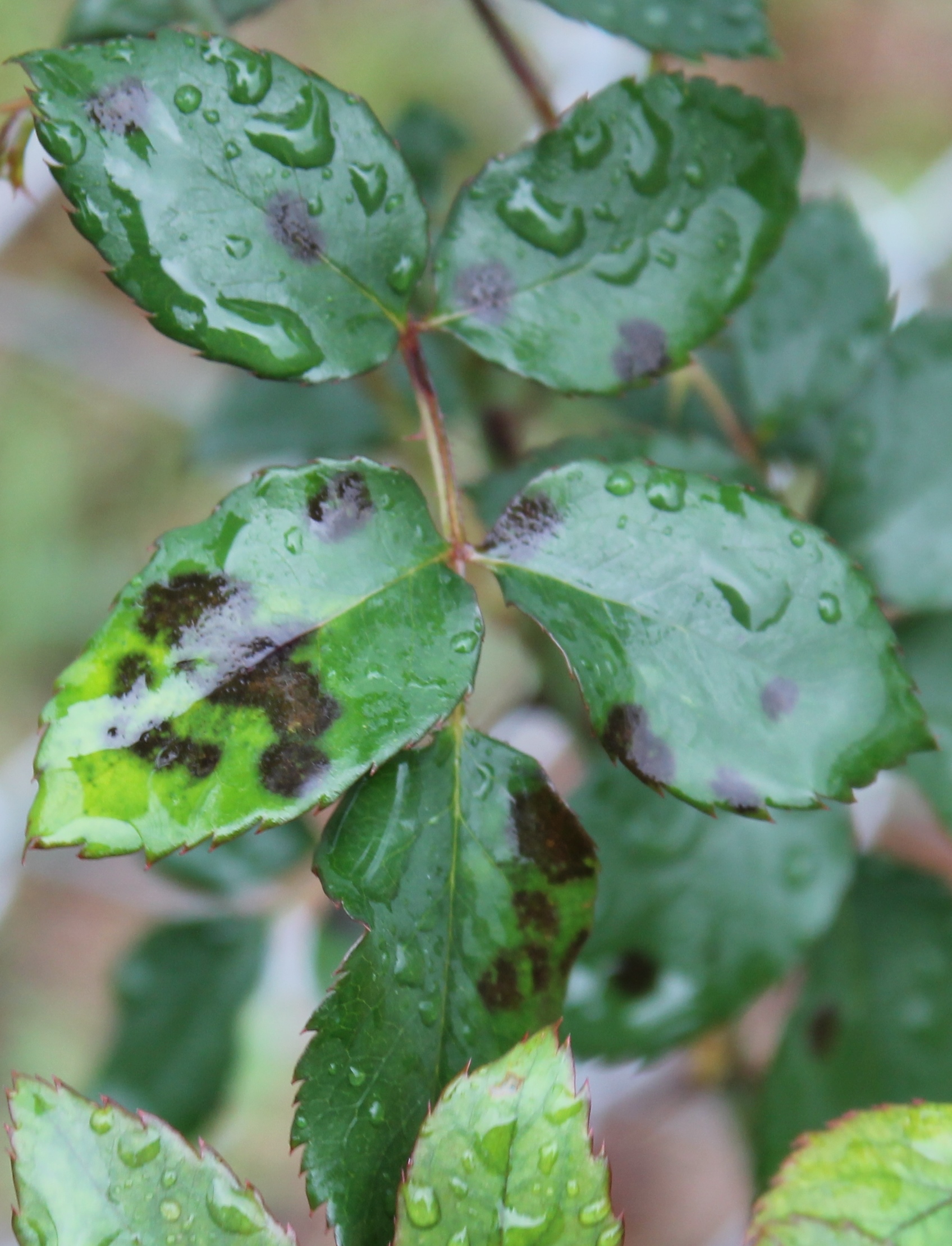
by Matthew Orwat | Mar 18, 2014
March may seem a little early to worry about fungal diseases, but recent prolonged wet weather and warmer temperatures have made the climate just right for a variety of leaf diseases in the Florida Panhandle. One in particular, Blackspot (Diplocarpon rosae), is particularly problematic for the discerning rose grower. Blackspot is just beginning to be seen this season on non-resistant rose cultivars throughout the central Florida panhandle.
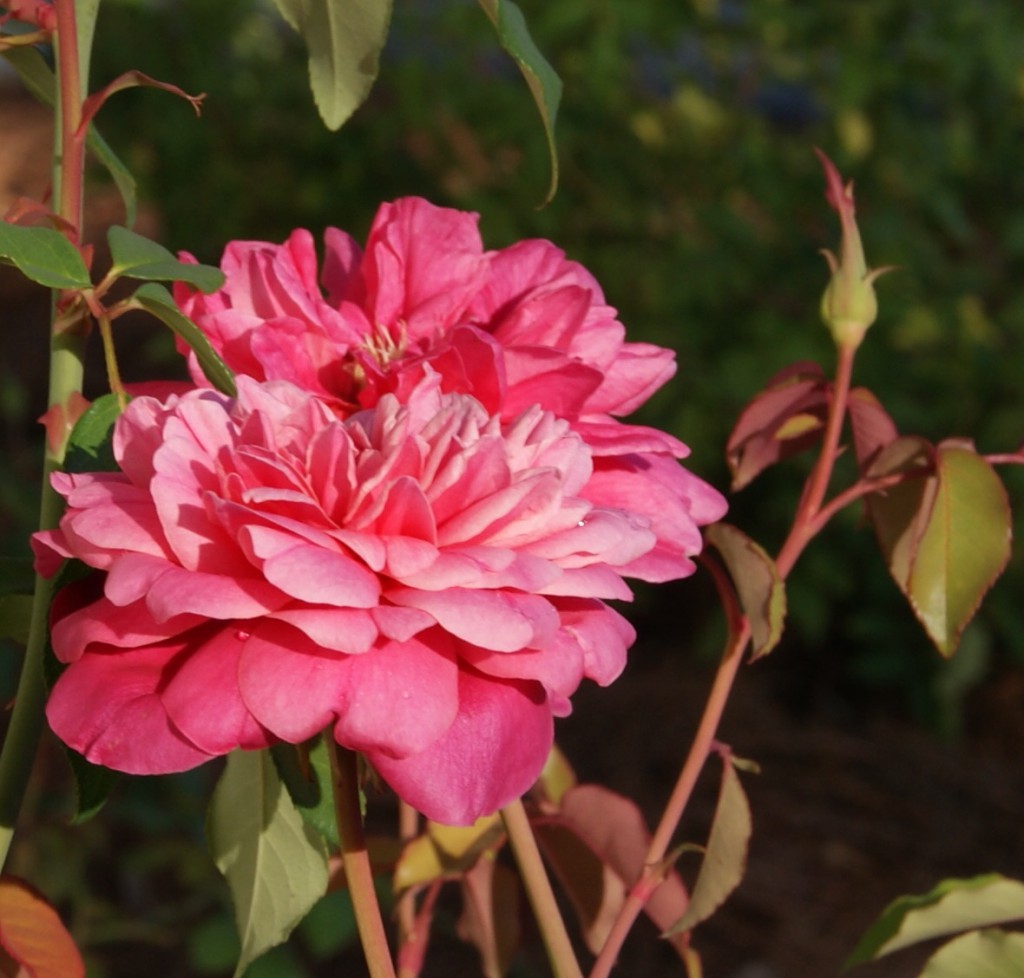
Monsieur Tillier, a rose that shows promise for blackspot resistance, is also part of the Earthkind program. Image Credit Matthew Orwat
Blackspot spores are spread from the canes or leaves of the previous season’s growth by rain or overhead irrigation. To minimize innoculum (black spot spores) remove all leaves from the previous season and any dead leaves at the base of the plant. After the annual pruning in mid to late February, it is a good idea to spray roses with sulfur or copper based fungicidal soap. This helps kill spores that have been laying dormant throughout the winter. Be careful not to spray these products when temperatures rise above 80 ° F. Doing so could burn the plants, although these products will damage tender young growth as well at temperatures below 80 ° F .
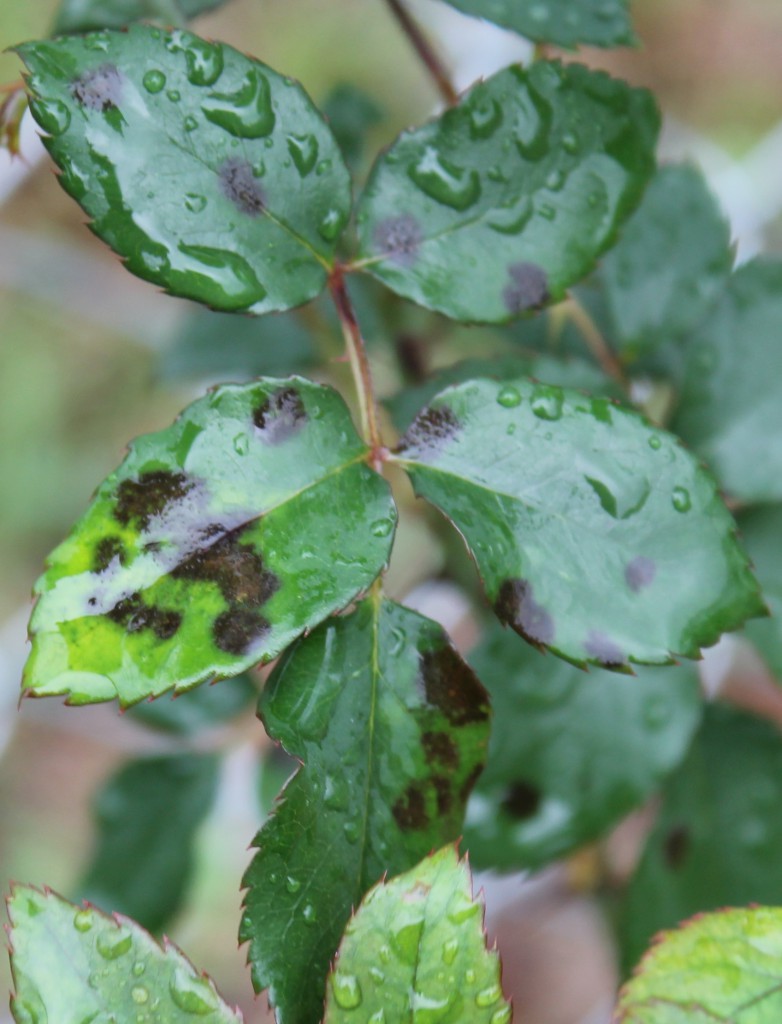
Wet, blackspot affected leaves. Image Credit Matthew Orwat
While dormant sprays often allow rose gardeners to get ahead of the disease, the best defense for the home garden is to plant resistant cultivars. There are several old and new resistant cultivars on the market. Some new resistant cultivars of note include Home Run and Knockout. Also, several older cultivars have demonstrated excellent resistance, such as Mrs. B.R. Cant and Spice. The author has been working with several older rose cultivars at the UF / IFAS Washington County Extension demonstration garden that have shown resistance during the last three years. While this demonstration garden is not a scientific study, several roses that have demonstrated some merit include Belinda’s Dream, Monsieur Tillier, Mme. Antoine Mari, Rosette Delizy and Souvenier de la Malmaison. Another resource for information on disease resistant roses is the Texas Earthkind rose program from Texas A&M University. While disease resistance is not always identical in different parts of the county, their recommended list gives the beginning rose gardener a good place to start.
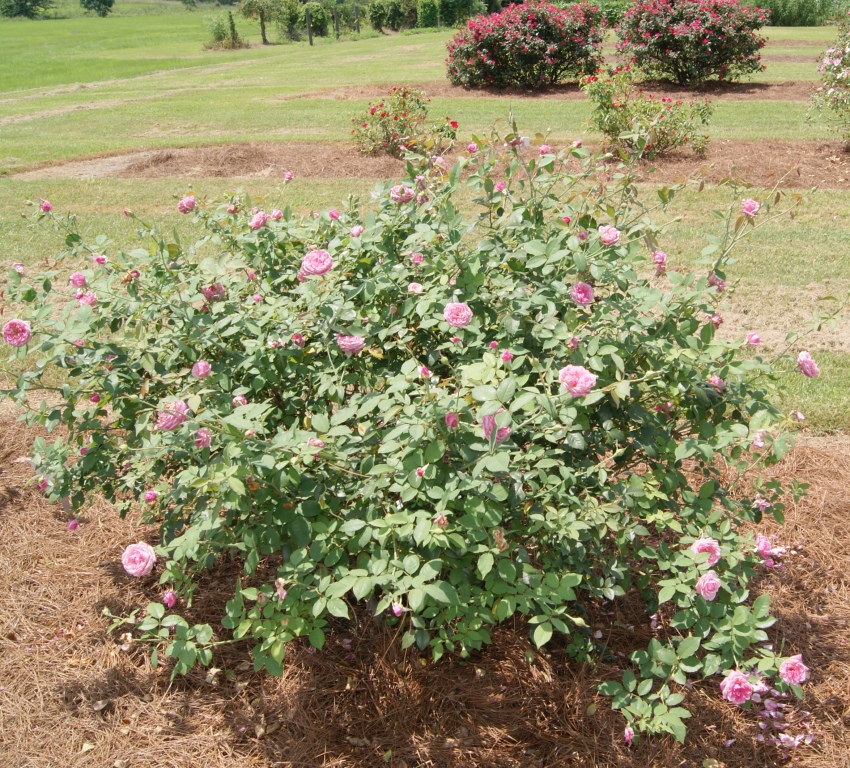
Mrs. B. R. Cant, a tea rose from 1901 has shown very good blackspot resistance at the UF IFAS rose trials in Quincy, FL. Image Credit Matthew Orwat
Several other cultural methods that will prevent spread of this disease among the rose garden include avoiding overhead irrigation, planting in well ventilated areas and proper plant spacing. These techniques attempt to make the garden environment inhospitable for blackspot proliferation.
Regardless if these management techniques are followed, if traditional large, long-stemmed, high maintenance Hybrid Tea roses are desired, most Florida rose gardeners will need to begin a spray schedule to prevent the onslaught of blackspot. Several fungicides are on the market to aid in this process, but remember that they must be used regularly (every 7-14 days) and modes of action must be rotated. This means that different types of fungicide must be rotated so that resistance to a particular fungicide by the blackspot organism does not develop. Below is a table of recommended fungicides for homeowner blackspot control. For more information, please consult the UF IFAS Extension publication P268, Blackspot of Rose.
Fungicide products marketed toward homeowners for control of black spot on roses
|
Active ingredient
|
Fungicide group
|
Trade name
|
|
Copper hydroxide
|
M1
|
Hi-Yield ® Copper |
|
Copper Sulfate
|
M1
|
Bonide® Copper Dust |
|
Copper Octanoate
|
M1
|
Bonide® Liquid Copper, Natural Guard Copper Soap, Ortho® Disease B Gon® Copper Fungicide |
|
Sulfur
|
M2
|
Bonide® Sulfur Dust, Ferti-lome® Dusting Sulfur, Green Light, Hi-Yield® Dusting Wettable Sulphur, Ortho® Bug-B-Gon® Rose & Flower Care |
|
Mancozeb
|
M3
|
Bonide® Mancozeb |
|
Captan
|
M4
|
Bonide® Captan 50WP, Hi-Yield® Captan 50W Fungicide |
|
Chlorothalonil
|
M5
|
Bonide® Fungonil, Ferti-lome® Broad Spectrum, Hi-Yield® Vegetable, Flower, Fruit and Ornamental Fungicide, Monterey, Ortho® Disease B Gon™ Garden Fungicide , Monterey Fruit Tree, Vegetable & Ornamental Fungicide |
|
Myclobutanil
|
3
|
Spectracide Immunox® Multi-Purpose Fungicide |
|
Propiconazole
|
3
|
Ferti-lome® Liquid Systemic Fungicide, Monterey Fungi-Fighter |
|
Tebuconazole
|
3
|
Bayer Advanced™ Disease Control for Roses, Flowers & Shrubs |
|
Tebuconazole + Imidacloprid
|
3 +
|
Bonide® Rose RX Systemic Drench, Feti-lome® 2-N-1 Systemic |
|
Triforine
|
3
|
Ortho® RosePride® Disease Control |
|
Calcium Polysulfide
|
NC
|
Hi-Yield® Lime Sulfur Spray |
|
Neem Oil
|
NC
|
Bonide® RX 3 in 1, Green Light® Neem Concentrate, Green Light® Rose Defense®, Monterey |
|
Acetamiprid + Triticonazole
|
NC + 3
|
Ortho® Bug B Gon® Insect & Disease Control |
|
Acephate + Resmethrin + Triforine
|
NC + NC + 3
|
Ortho® RosePride® Insect, Disease & Mite Control |
| Fungicide Group (FRAC Code): Numbers (1-37) and letters (M) are used to distinguish the fungicidal mode of action groups. All fungicides within the same group (with same number or letter) indicate same active ingredient or similar mode of action. This information must be considered in making decisions about how to manage fungicide resistance. M=Multi-site inhibitors, fungicide resistance is low; NC= not classified. Source: http://www.frac.info/ (Fungicide Resistance Action Committee, FRAC).
Always read a current product label before applying any chemicals.
|
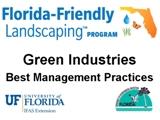
by Matthew Orwat | Mar 4, 2014
 In 2014, a new law took effect requiring all commercial fertilizer applicators (for hire) to have a license. This law was passed in 2009 and took effect on January 1 of this year. A requirement that must be completed to obtain this license is to successfully complete a Green Industries Best Management Practices (GI-BMP) training class. One option to fulfill this requirement is to enroll in a GI-BMP class at the local county extension office. This training is provided by UF IFAS extension at various extension offices across Florida in both English and Spanish.
In 2014, a new law took effect requiring all commercial fertilizer applicators (for hire) to have a license. This law was passed in 2009 and took effect on January 1 of this year. A requirement that must be completed to obtain this license is to successfully complete a Green Industries Best Management Practices (GI-BMP) training class. One option to fulfill this requirement is to enroll in a GI-BMP class at the local county extension office. This training is provided by UF IFAS extension at various extension offices across Florida in both English and Spanish.
These classes instruct green industry professionals in techniques of fertilizer, pesticide and irrigation application that help reduce and prevent pollution caused by runoff and leaching. Runoff and leaching is usually driven by rainfall and creates non-point source pollution. By learning how to implement the safest methods of fertilizer and pesticide application into their daily work, green industry professionals can do their part in the effort to maintain and improve Florida’s water quality and environment.
After receiving a certificate of completion, a person must pay $25 and apply to receive a limited certification for urban landscape commercial fertilizer application. A person possessing such a certification is not subject to additional local testing. The certification expires 4 years after the date of issuance and needs to be renewed at that time. Florida City and County employees that apply fertilizer as part of their job duties do not need to obtain the license to be in compliance with the new fertilizer rule, but they must complete the training and obtain a certificate of completion from the GI-BMP program.
[important]The Next GI-BMP class will be held Tuesday, March 11 at the UF IFAS Washington County Extension Office in Chipley Florida. This office is located at 1424 Jackson Ave (also US HWY 90) Suite A. It begins at 8am central time in the East Wing conference room. To register, contact Matthew Orwat or Cynthia Jackley at 850-638-6180 or mjorwat@ufl.edu Cost is $20.00 and lunch is provided.[/important]
The GI-BMP program has FDACS approval for 2 Core CEUs and 2 additional CEUs for the following licenses:
- Private Applicator – Agriculture
- Ornamental & Turf
- Limited Lawn & Ornamental
- Limited Landscape Maintenance
- Commercial Lawn and Ornamental
- Limited Commercial Fertilizer Applicators
- (2) Limited Urban Fertilizer credit hours
Article by Matthew Orwat and Sheila Dunning
by Matthew Orwat | Jan 27, 2014
Recently, I was working on a camellia identification project in a forgotten camellia garden of about 60 plants. Most camellias I observed were not yet in flower but one in particular caught my eye. I later identified this eye catcher as Camellia japonica ‘Magnoliaeflora’.
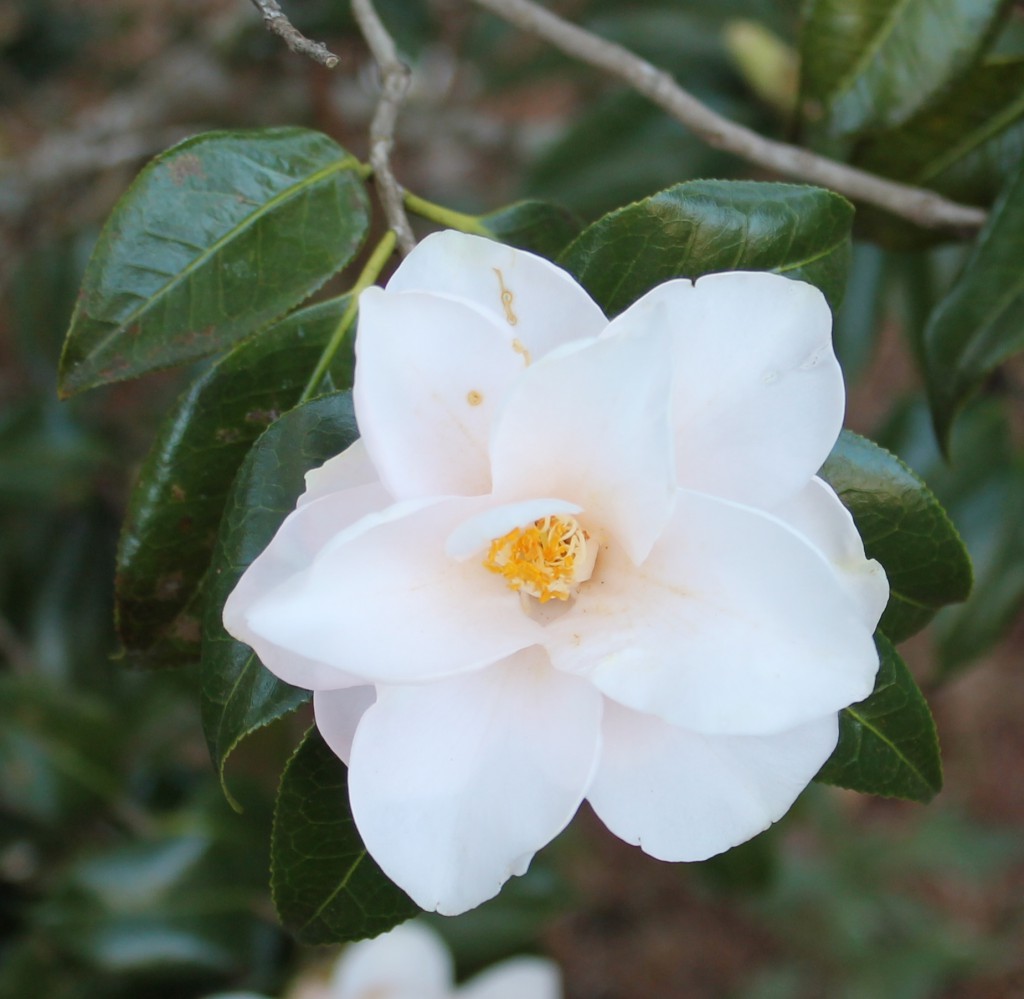
Flower of Camellia japonica ‘Magnoliaeflora’
Image Credit Matthew Orwat
Magnoliaeflora is so named due to its off white magnolia formed semi-double flowers. It’s petals have a distinctive curl and can sometimes resemble a star. Plants are slow-growing but can reach six feet tall and four feet wide after several decades. This slow growth makes it ideal for smaller landscapes where some giant japonica cultivars would be out-of-place.
Its buds and flowers are resistant to cold temperatures, thus flowering is able to occur in mid January, a tad earlier than many other japonicas. This classic camellia should be tried in more Northwest Florida landscapes, particularly newer ones where camellias seem all but absent.
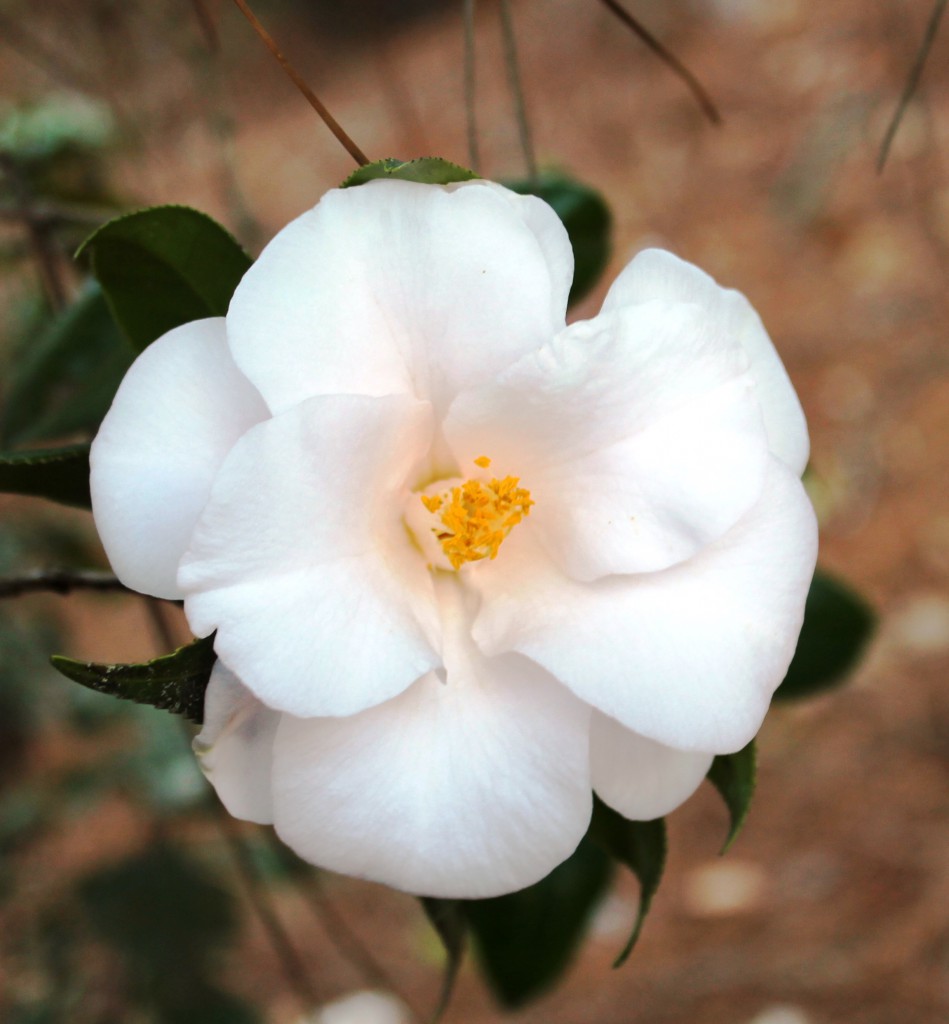
Flower of Camellia japonica ‘Magnoliaeflora’
Image Credit Matthew Orwat
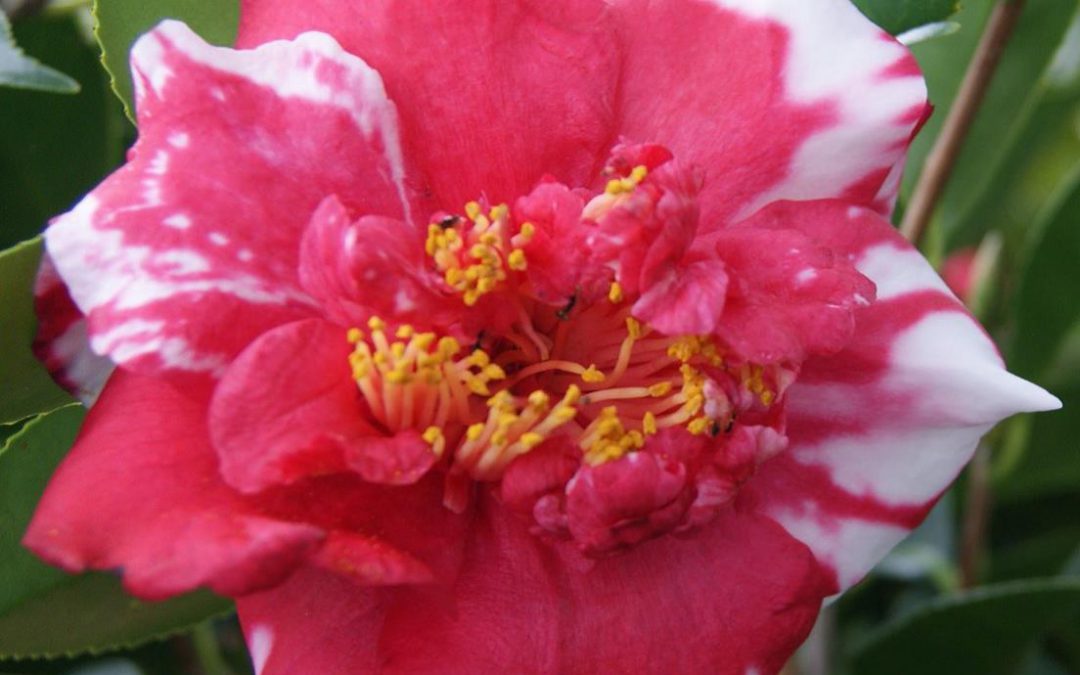
by Matthew Orwat | Jan 14, 2014
Want to learn how to graft Camellias?
Graft your favorite cultivar onto an adapted rootstock!
Saturday January 18th 9:00am – 12:00pm CST !
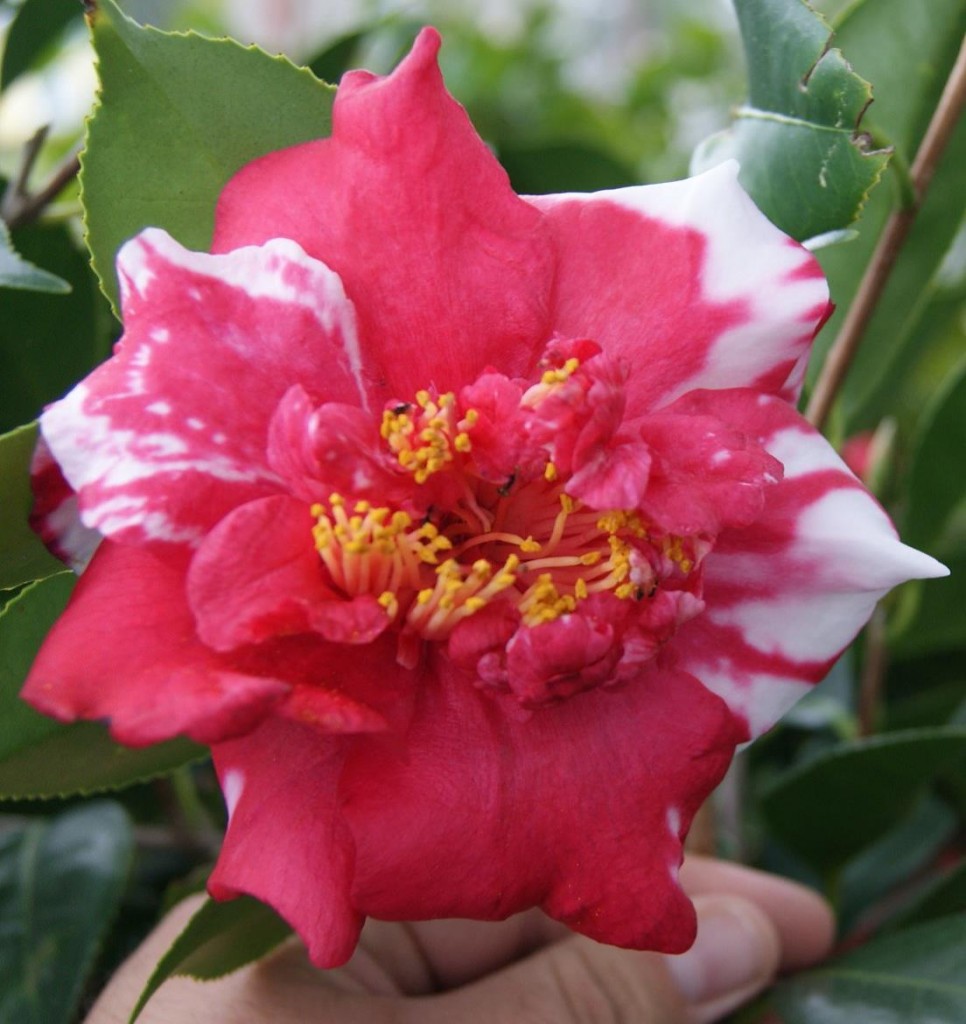
- Join us to learn how to graft your favorite camellia cultivar onto an adapted rootstock
- You can take home your own grafted camellia
- Hosted by Maphis Tree Farm and UF IFAS Extension Washington County
- You will engage in hands on grafting of Camellias for your gar-den. You will take home a grafted Camellia of your own All sup-plies will be furnished by Maphis Tree Farm at a cost of only $30.00 per person
- Maphis Tree Farm 1534 orange Hill Hwy Chipley, FL.
- Call or Email Maphis Tree Farm toregister at 850-638-8243
 maphistreefarm@bellsouth.net
maphistreefarm@bellsouth.net
 UF IFAS Washington County Extension is offering a class for the Limited Commercial Landscape Maintenance Pesticide license and the Limited Lawn and Ornamental license.
UF IFAS Washington County Extension is offering a class for the Limited Commercial Landscape Maintenance Pesticide license and the Limited Lawn and Ornamental license.








